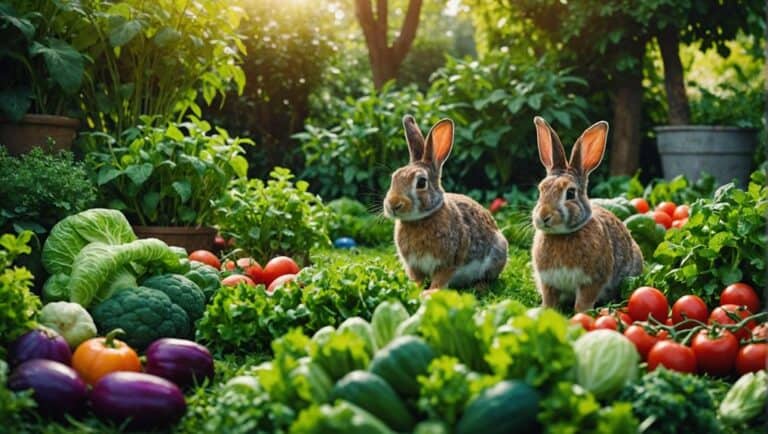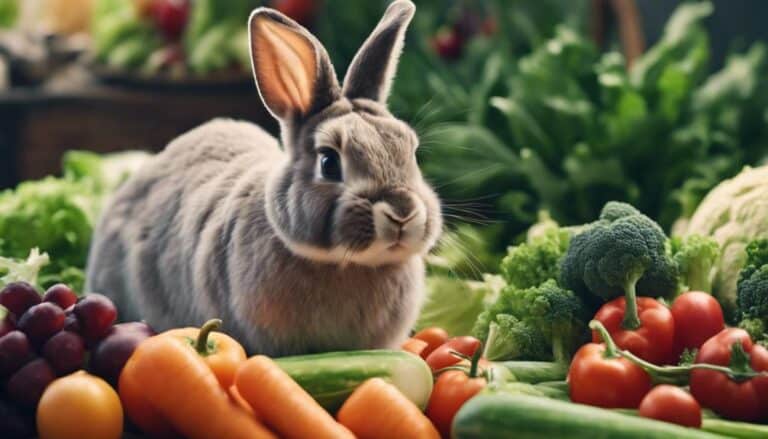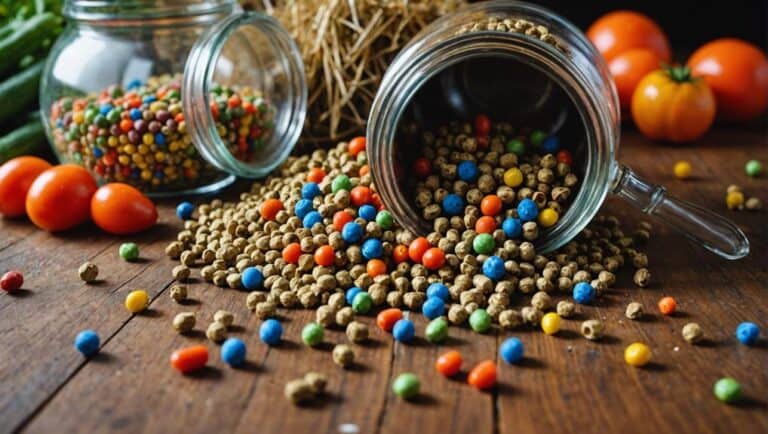If you're looking to provide your bunny with a well-rounded diet, focusing on the best vegetables is crucial. Incorporating nutrient-rich options can greatly impact your furry friend's health.
From leafy greens to colorful bell peppers, the variety of veggies available can cater to your bunny's specific dietary needs.
But what exactly are the top vegetables that should be on your bunny's menu? Stay tuned to discover the ultimate selection that can elevate your bunny's diet and well-being.
Contents
Key Takeaways
- Leafy greens like lettuce and kale provide essential vitamins for your bunny's health.
- Non-leafy vegetables such as carrots and zucchini offer a balanced diet rich in nutrients.
- Edible flowers like pansies and marigolds are safe and nutritious treats for bunnies.
- Store veggies in a cool, dry place and monitor for spoilage to ensure fresh and safe food for your bunny.
Nutritious Leafy Greens for Bunnies
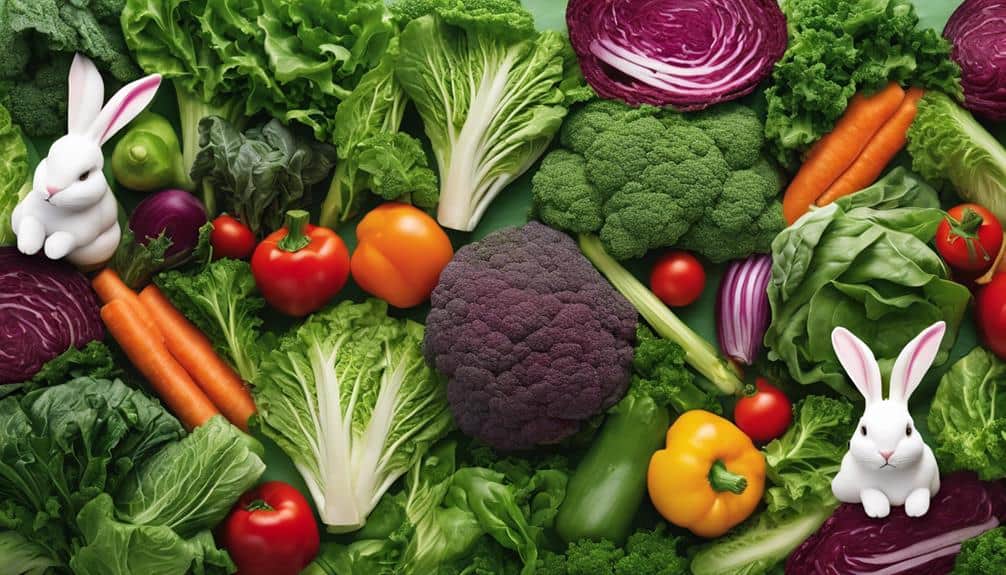
When considering the nutritious leafy greens suitable for a bunny's diet, a variety of options offer essential vitamins and nutrients for their overall health and well-being. Leafy lettuces are a staple daily vegetable for rabbits, providing a balanced mix of important vitamins and nutrients necessary for their diet.
Arugula stands out as a highly nutritious and safe choice for rabbits, offering a spicy flavor that many bunnies enjoy without harmful chemicals. Similarly, kale, rich in protein and various nutrients, has relatively low levels of necessary acid compared to other greens, although it should be introduced slowly to prevent digestive discomfort.
Dandelion greens, often considered as weeds, are highly nutritious and can boost a rabbit's immune system, prevent infections, and reduce pain and inflammation. Celery leaves are an excellent source of unique nutrients for rabbits, containing vitamins and minerals uncommon in other foods, along with phthalides that lower blood pressure and reduce stress.
These leafy greens aren't only nutritional but also aid in proper digestive function, contributing to a well-rounded diet for your bunny's health.
Best Non-Leafy Vegetables for Bunnies
For a well-rounded diet that supports your bunny's health, incorporating non-leafy vegetables like broccoli, cauliflower, and bell peppers is essential.
Carrots, rich in beta-carotene, zucchini packed with vitamins, and fiber-filled green beans are excellent additions to make sure your rabbit's digestive system stays healthy.
Adding in parsnips, Brussels sprouts, and peas in moderation can diversify your bunny's vegetable intake, offering a range of nutrients.
Artichoke leaves, a source of antioxidants, along with nutrient-rich pumpkin, can contribute to your bunny's overall well-being.
Remember, a mix of these non-leafy vegetables guarantees a balanced and nutritious meal plan for your furry friend.
By providing a variety of these veggies, you can help maintain your rabbit's health and happiness.
Bunnies' Favorite Edible Flowers
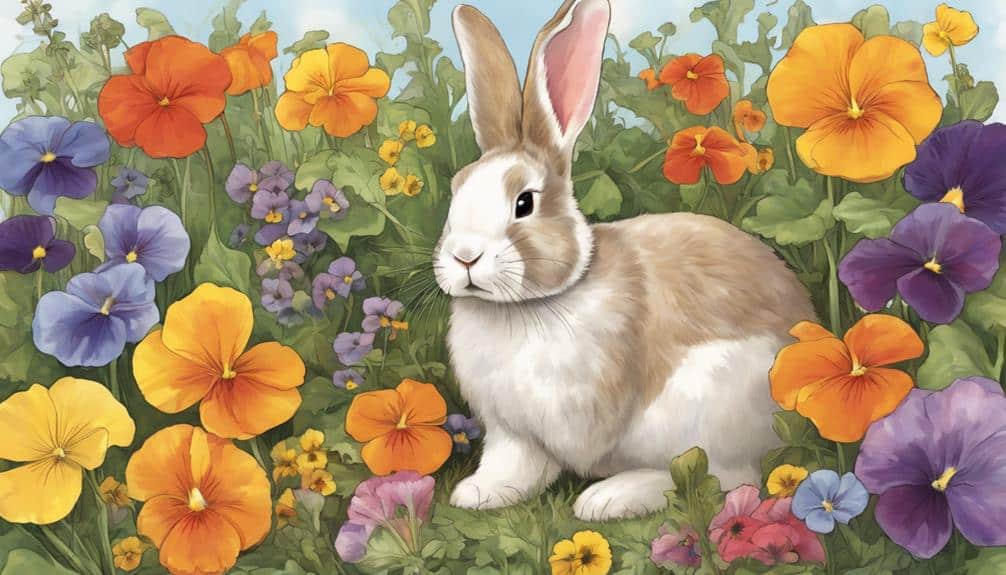
To further broaden your bunny's dietary options and cater to their taste preferences, exploring a selection of edible flowers can be a delightful and nutritious addition to their feeding regimen. Edible flowers like pansies, dandelions, and roses are safe and nutritious treats for bunnies, providing essential nutrients such as antioxidants, vitamins, and minerals. Bunnies enjoy nibbling on a variety of edible flowers like marigolds, hibiscus, and nasturtiums, which not only add diversity to their diet but also offer potential health benefits.
Some favorite edible flowers for bunnies include lavender, calendula, and chamomile due to their enticing flavors and the enriching properties they bring. Incorporating these edible flowers into your bunny's diet as occasional treats can enhance their overall nutritional intake and provide mental stimulation through foraging and trying new flavors. Remember to introduce new flowers gradually and make sure they're free from pesticides or other harmful chemicals to keep your bunny safe and healthy.
Vegetables to Avoid for Bunnies
Feeding bunnies vegetables high in oxalic acid should be limited to prevent urinary issues. Certain vegetables, such as spinach, parsley, and beet greens, fall into this category and shouldn't be overconsumed by your furry friend.
Additionally, vegetables with high levels of starch like potatoes, corn, and peas should be restricted in your bunny's diet to prevent potential digestive problems. Onions, garlic, leeks, and chives are best avoided altogether due to their ability to cause gastrointestinal distress and harm a bunny's red blood cells. These items can lead to serious health issues if ingested by your pet.
Keeping these vegetables out of your bunny's meals will help maintain their well-being and prevent unnecessary health complications. Remember that a bunny's digestive system is sensitive, and providing a diet that aligns with their specific needs is essential for their overall health and happiness.
Proper Storage of Bunny Vegetables
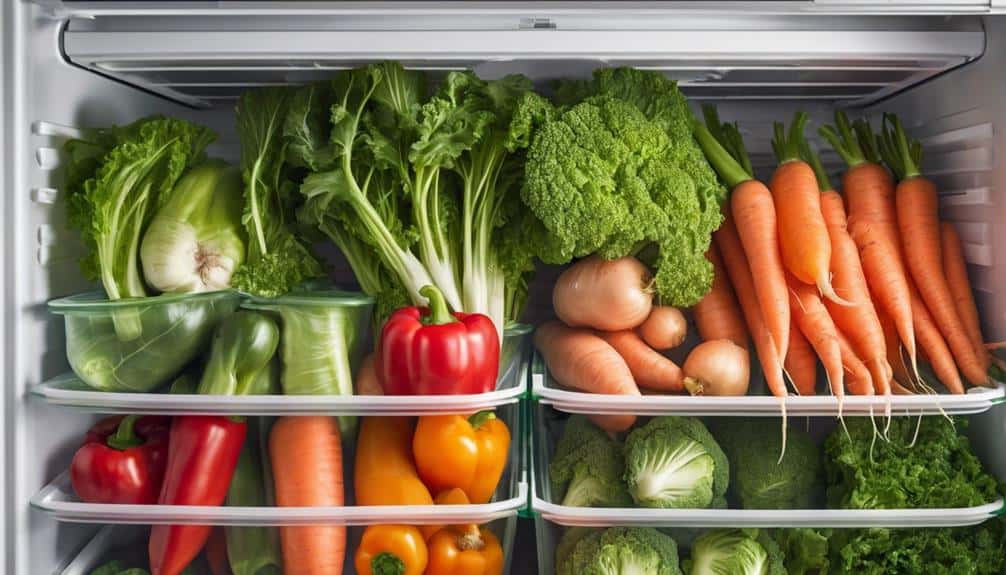
How should you store bunny vegetables to maintain their freshness and quality?
Proper storage of bunny vegetables is important to make sure they remain safe and nutritious for your pet rabbit. To maintain freshness, store leafy greens and fresh vegetables in a cool, dry place. Use breathable bags or containers to prevent condensation, which can lead to spoilage. Avoid plastic bags or airtight containers that can cause vegetables to rot faster. Check vegetables regularly for signs of spoilage like wilting, mold, or unpleasant odors.
Frequently Asked Questions
What Vegetables Can Rabbits Eat Daily?
You can feed rabbits a variety of vegetables daily to meet their nutritional needs. Include leafy greens like kale and spinach, along with carrots, bell peppers, broccoli, and cucumber. These veggies provide essential nutrients for your bunny's health.
What Is the Healthiest Food for Bunnies?
For bunnies, the healthiest food includes leafy greens, carrots for vitamin variety, and fiber-rich veggies. Ensuring proper hay intake, adequate water, and balanced meals support digestive health. Treats should be given in moderation to maintain a nutritious diet.
Which Vegetable Should Not Be Given to Rabbits?
You should avoid feeding rabbits onions, garlic, leeks, chives, and corn due to their potential harm. Onions and garlic can damage red blood cells, while corn's high starch content can disrupt digestion. Be mindful of these risks for your bunny's well-being.
Can Rabbits Eat Celery Everyday?
You can give rabbits celery daily, adding variety to their diet. It's hydrating and nutritious. Include leaves, stalks, and even seeds. Remember, moderation is key. Consider other veggies like carrots, bell peppers, and zucchinis for a balanced diet.
Conclusion
Now that you have learned about the top vegetables for a bunny's healthy diet, it's time to put your knowledge to the test. Conduct a small experiment by offering your bunny a variety of these nutritious veggies and observe their response.
By actively engaging with your pet's diet, you can further understand the impact of different vegetables on their health and well-being.
Remember, a balanced and diverse diet is key to keeping your bunny happy and healthy.

